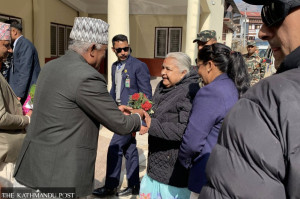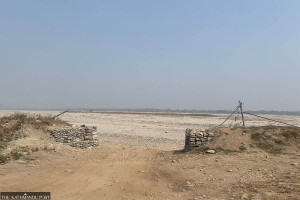Koshi Province
Darimba–Chiwabhanjyang stretch of national pride project left in lurch
The delay in construction has inconvenienced local residents and businesspersons.
Devendra Bhattarai & Laxmi Gautam
Tej Bahadur Begha, a 72-year-old farmer from Tintimbu village, has been harbouring dreams of driving along the Mid-Hill Highway section that connects his village to Chiwabhanjyang, a market along the Nepal-India border.
Although the construction of the highway section began a couple of years ago, the road that goes all the way to the border of Sikkim in India is yet to become motorable.
“The track was opened a few years ago and it was around that time I heard that the Panchthar was linked with the highway,” said Begha. “The poor condition of the Darimba–Chiwabhanjyang stretch of the highway has me worried because even walking along the road section is risky, let alone driving through it.”
The construction of the Mid-Hill Highway commenced in the fiscal year 2007-08 as an alternative road to the East-West Highway. The 1,776 km-long national pride project connects Chiwabhanjyang of Panchthar district in the east to Jhulaghat of Baitadi district in the west.
A total of 114 km of the highway lies in Panchthar. The road has already been blacktopped from the Tamor river to Darimba. However, the 51 km long Darimba–Chiwabhanjyang is in a sorry state.
The federal government signed a project agreement with Shibashakti Construction Service in 2020 to upgrade and blacktop the road stretch. As per the agreement, the project should be completed within two years. But only around 10 percent work is completed as of now.
“Though the highway has been enlisted as a national pride project, it seems that the government has not prioritised the Panchthar section,” said Trilochan Adhikari, a schoolteacher in Chyangthampu. “The highway would obviously make a sea change in the economic and social lives of the people if the political leaders from the region pressured the government for its timely construction.”
The construction company says the Covid-19 pandemic, prolonged monsoon season this year and shortage of workers delayed upgradation work along the Darimba–Chiwabhanjyang road section.
“We wrote an application to the government for an extension of the project deadline by one year citing that the Covid-19 pandemic and adverse weather disrupted the construction work,” said Surendra Pathak, the proprietor of Shibashakti Construction Service. “The construction work will possibly resume after Tihar.”
However, the Mid-Hill Highway Project Office is not convinced of the contractor’s arguments. “The Covid-19 pandemic was not the only reason for the project delay,” said Arjun Kumar Bam, chief at the project office. “The construction company delayed the project on various other pretexts as well. We called the contractor at the office and discussed the issue. The company has expressed its commitment to resume work soon.”
The road upgradation work began by dividing the Darimba–Chiwabhanjyang stretch into three sections. Vehicles run along the recently-gravelled Darimba–Chyangthapu road section but driving along the 30 km of road from Chyangthapu to the Nepal-India border is dangerous given the poor condition of the road.
Border outpost of the Armed Police Force (APF) at Chiwabhanjyang has a tough time transporting foodstuff and other essentials due to the poor condition of the road. The people who keep yak and sheep sheds in the Chiwa area, which lies at an altitude of around 3,200 metres above sea level, also face difficulties managing food and supplying their products.
“We have to store food to last us a couple of months because there is no guarantee of supply,” said Ganga Prasad Pandey, chief at the APF’s border post.
The nearest market, Uttare Bazaar of Sikkim, is around 23 km from Chiwa border point. A Nepali national can go to Uttare Bazaar with permission from Sashastra Seema Bal, the border security force of India.
Himal Begha, who is running a homestay near the zero point of Mid-Hill Highway in Chiwabhanjyang, complained that he often faces difficulties managing food and other essentials for the visiting tourists due to transportation problems. “We cannot bring goods from Sikkim,” he said. “We have to spend a lot of money on transportation to pay the porters.”




 21.13°C Kathmandu
21.13°C Kathmandu












